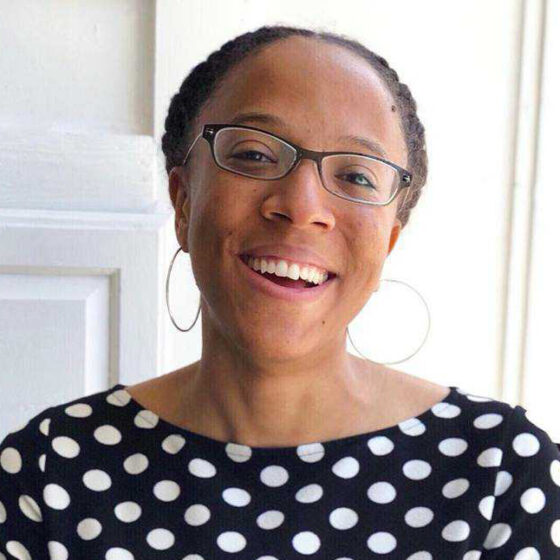Ahmina Maxey

Ahmina Maxey
Ahmina Maxey has over 15 years of experience working in environmental grassroots organizing and nonprofits, as well as organizing to increase capacity and financial stability for nonprofit organizations. She is passionate about helping bring resources to communities of color and working to mitigate the impacts of environmental racism. Ahmina has worked with communities nationwide, including, but not limited to, Maryland, Michigan, California, and Connecticut. Her activism brought her to the 2009, 2011, and 2015 UNFCC COP's in Cancun, Durban, and Paris to hold the United States accountable for their emissions and contributions to climate change. Specifically, she has worked to organize against air pollution and environmental racism in communities of color and to increase capacity for community and grassroots organizations.
Ahmina was born in Detroit, Michigan, and raised in Holly, Michigan, on a 10-acre plot. Being close to nature and camping, hiking, and skiing with her family inspired her love of nature. Her family’s love and knowledge of the outdoors sparked her interest in the environment. After graduating high school, Ahmina studied in the Program of the Environment with a minor in African Studies at the University of Michigan.
Ahmina has been engaged in environmental justice work since college. As part of a team, she helped to organize against the Detroit Incinerator, which finally closed in 2019. She has also worked to combat air pollution in Michigan's communities of color with the East Michigan Environmental Action Council (EMEAC) and Zero Waste Detroit. At EMEAC, she and other team members worked with the Young Educators Alliance to educate Detroit youth about environmental justice. In 2013, Ahmina co-founded the Building Equity & Alliance for Impact Initiative (BEA) alongside other organizers. The BEA was established to connect grassroots environmental justice organizations, environmental funders, and mainstream environmental groups to increase funding for grassroots efforts and foster stronger collaboration in the fight for climate and environmental justice. One of the BEA's first projects was bringing organizations together to strategize and advance Obama's Clean Power Plan. In 2015, Ahmina joined the Global Alliance for Incinerator Alternatives (GAIA), where she worked to organize against waste incinerators and promote waste reduction. During this time, she created the Failing Incinerators Project, which provided over one million dollars to support environmental justice communities fighting incinerators nationwide.
From 2019-2021, Ahmina served as the Transforming Power Fund (TPF) Executive Director, the first participatory grantmaking organization in Detroit. While at TPF, Ahmina helped raise and distribute over one million dollars in funding to organizations combating injustice in Detroit. She later continued her environmental justice work as the Operations Director and, subsequently, Executive Director of the Michigan Environmental Justice Coalition. Ahmina currently works as a Network Liaison at Allied Media Projects, where she supports media-based and social justice projects in strengthening their organizing efforts. Her work has taken her to many communities and organizations worldwide to combat environmental racism and increase organizational capacity.
Mentors taught Ahmina the power of hard work and have helped her gain confidence throughout her career in environmental justice. Dr. Dorceta Taylor served as a mentor for Ahmina throughout undergrad and beyond. Dr. Taylor's mentorship and leadership showed Ahmina the power of hard work, intellect, and fortitude. In her organizing career, Ahmina was mentored by Rhonda Anderson, the former Sierra Club Environmental Justice Organizer for Southeast Michigan. Ms. Anderson instilled in her the importance of principled organizing rooted in the Principles of Environmental Justice. She reinforced the necessity of bottom-up organizing, ensuring that communities lead and speak for themselves.
When asked about mentorship, Ahmina emphasizes the significance of peer mentors. She has learned from and profoundly values the guidance and support of colleagues such as Michelle Martinez, Director of the University of Michigan's Tishman Center for Social & Environmental Justice, Owolabi Copeland, former Co-Executive Director of EMEAC, and Aiko Fukuchi of the Michigan Environmental Justice Coalition. These individuals have been thought partners, friends, and champions throughout her journey.
Ahmina also gives back to her community through mentorship. While working at EMEAC, she mentored youth in Detroit, educating them about environmental justice. At GAIA and Zero Waste Detroit, she guided individuals in the environmental justice and zero waste fields, sharing knowledge and support. She has also mentored young activists in Detroit, helping strengthen the city's environmental justice and activist community.
Ahmina encourages young professionals to seek mentors and thought partners because no one should navigate their career alone. Even a brief conversation with someone you admire can be transformative, and many seasoned professionals are willing to offer guidance.
Beyond mentorship, she stresses the critical importance of self-advocacy, particularly for Black women in nonprofit and environmental justice spaces. The unfortunate reality is that Black women are often expected to take on excessive workloads, primarily in organizations facing crises or early-stage growth. Research confirms this pattern—Black women are frequently placed in high-stakes leadership roles yet are met with resistance and undermining behavior from both above and below. While their emotional intelligence is valued, it is also often exploited.
Ahmina has learned firsthand that boundaries are non-negotiable. While dedication and passion can fuel a career, it cannot come at the expense of well-being. She urges emerging leaders to carefully assess workplaces for ingrained equity and strong support structures. When those structures are lacking - as is too often the case - it becomes even more vital to set clear limits on workload, maintain work-life balance, and refuse to let emotional labor be taken for granted.
Establishing these habits early allows professionals to lead with both strength and sustainability. Black women, in particular, should know that leadership can feel isolating, but they do not have to accept workplaces that fail to support them. It is possible to lead with both compassion and self-protection.
For deeper insights into these dynamics, Ahmina recommends reading the Nonprofit Quarterly's The Unseen Labor of Black Women Leaders or The Perils of Black Leadership.
Ahmina Maxey [Photo]. (n.d.). Allied Media Projects. Retrieved June 19, 2024 from https://alliedmedia.org/leader/ahmina-maxey